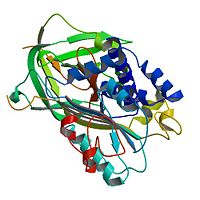1oc0
From Proteopedia
| Line 4: | Line 4: | ||
==Overview== | ==Overview== | ||
| - | The interaction of the plasma protein vitronectin with plasminogen | + | The interaction of the plasma protein vitronectin with plasminogen activator inhibitor-1 (PAI-1) is central to human health. Vitronectin binding extends the lifetime of active PAI-1, which controls hemostasis by inhibiting fibrinolysis and has also been implicated in angiogenesis. The PAI-1-vitronectin binding interaction also affects cell adhesion and motility. For these reasons, elevated PAI-1 activities are associated both with coronary thrombosis and with a poor prognosis in many cancers. Here we show the crystal structure at a resolution of 2.3 A of the complex of the somatomedin B domain of vitronectin with PAI-1. The structure of the complex explains how vitronectin binds to and stabilizes the active conformation of PAI-1. It also explains the tissue effects of PAI-1, as PAI-1 competes for and sterically blocks the interaction of vitronectin with cell surface receptors and integrins. Structural understanding of the essential biological roles of the interaction between PAI-1 and vitronectin opens the prospect of specifically designed blocking agents for the prevention of thrombosis and treatment of cancer. |
==Disease== | ==Disease== | ||
| Line 16: | Line 16: | ||
[[Category: Homo sapiens]] | [[Category: Homo sapiens]] | ||
[[Category: Protein complex]] | [[Category: Protein complex]] | ||
| - | [[Category: Carrell, R | + | [[Category: Carrell, R W.]] |
| - | [[Category: Huntington, J | + | [[Category: Huntington, J A.]] |
| - | [[Category: Pannu, N | + | [[Category: Pannu, N S.]] |
| - | [[Category: Read, R | + | [[Category: Read, R J.]] |
[[Category: Zhou, A.]] | [[Category: Zhou, A.]] | ||
[[Category: cell adhesion]] | [[Category: cell adhesion]] | ||
| Line 29: | Line 29: | ||
[[Category: serpin]] | [[Category: serpin]] | ||
| - | ''Page seeded by [http://oca.weizmann.ac.il/oca OCA ] on | + | ''Page seeded by [http://oca.weizmann.ac.il/oca OCA ] on Thu Feb 21 14:15:54 2008'' |
Revision as of 12:15, 21 February 2008
|
PLASMINOGEN ACTIVATOR INHIBITOR-1 COMPLEX WITH SOMATOMEDIN B DOMAIN OF VITRONECTIN
Contents |
Overview
The interaction of the plasma protein vitronectin with plasminogen activator inhibitor-1 (PAI-1) is central to human health. Vitronectin binding extends the lifetime of active PAI-1, which controls hemostasis by inhibiting fibrinolysis and has also been implicated in angiogenesis. The PAI-1-vitronectin binding interaction also affects cell adhesion and motility. For these reasons, elevated PAI-1 activities are associated both with coronary thrombosis and with a poor prognosis in many cancers. Here we show the crystal structure at a resolution of 2.3 A of the complex of the somatomedin B domain of vitronectin with PAI-1. The structure of the complex explains how vitronectin binds to and stabilizes the active conformation of PAI-1. It also explains the tissue effects of PAI-1, as PAI-1 competes for and sterically blocks the interaction of vitronectin with cell surface receptors and integrins. Structural understanding of the essential biological roles of the interaction between PAI-1 and vitronectin opens the prospect of specifically designed blocking agents for the prevention of thrombosis and treatment of cancer.
Disease
Known diseases associated with this structure: Hemorrhagic diathesis due to PAI1 deficiency OMIM:[173360], Thrombophilia due to excessive plasminogen activator inhibitor OMIM:[173360]
About this Structure
1OC0 is a Protein complex structure of sequences from Homo sapiens. Full crystallographic information is available from OCA.
Reference
How vitronectin binds PAI-1 to modulate fibrinolysis and cell migration., Zhou A, Huntington JA, Pannu NS, Carrell RW, Read RJ, Nat Struct Biol. 2003 Jul;10(7):541-4. PMID:12808446
Page seeded by OCA on Thu Feb 21 14:15:54 2008

